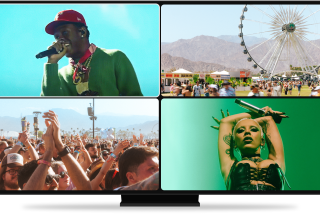YouTube to regain Warner Music videos
Music videos from Green Day, Jay-Z and Linkin Park will begin reappearing on YouTube as soon as December, the result of a multiyear agreement reached with Warner Music Group Corp.
The Internet’s dominant video site and one of the world’s largest music companies had been locked in a dispute over the value of music videos, some of the most popular content on YouTube, whose young viewers are coveted by advertisers.
Licensing talks reached an impasse late last year, resulting in Warner’s videos being pulled from the site.
The stakes are high for both parties.
Google Inc.’s YouTube, the undisputed leader in online video, has struggled to attract advertisers with its user-created content. It is increasingly striking deals to bring professionally made videos to the site.
The music labels, meanwhile, are eager to explore new sources of revenue to help offset plummeting CD sales, which fell 25% in the last year, according to the Recording Industry Assn. of America.
“These are two parties that really couldn’t need each other any more than they already do,” said Sonal Gandhi, an analyst with Forrester Research. “YouTube needs music videos because, despite all the user-generated content, [the videos] are responsible for getting a lot of people and keeping them. Warner needs YouTube because that’s how young people discover music these days.”
Before Warner Music removed its content from YouTube, its videos had logged nearly 1.1 billion views since 2006 -- so many that despite its nine-month absence, Warner still ranks No. 5 among the site’s content suppliers, according to researcher TubeMogul Inc.
Indeed, YouTube has proved as powerful a force for music discovery among contemporary music fans as radio was a generation ago. Music videos from the major labels, including Walt Disney Co.’s Hollywood Records, account for 42.8 million views in a typical day, TubeMogul said.
“When you consider only 36.7% of YouTube’s top 100 [videos] are monetized, it’s difficult to understate the labels’ importance to YouTube’s bottom line,” said David Burch, TubeMogul’s marketing director. The agreement announced Tuesday allows Warner Music to control the advertising sold around its music videos and split the proceeds with YouTube, retaining the majority of the revenue.
In an effort to attract advertisers, the music company will attempt to create a better presentation surrounding its artists’ music on YouTube with high-definition videos, a cleaner look, links to the musician’s or band’s website and eventually songs or other merchandise to purchase.
“We view this deal as a positive for Warner Music Group, given greater control over the distribution of its content, the potentially more favorable advertising split with YouTube and the opportunity to benefit more greatly from e-commerce,” wrote Ingrid Chung, a media analyst with Goldman, Sachs & Co.
YouTube’s abundance of online videos is catnip to its 100 million users, but that abundance undercuts the ad rates it can command relative to other sites with exclusive access to TV shows or movie offerings, advertisers say.
“We have to be very, very careful as it [buying ad time] relates to user-generated content, and most of the content on YouTube is just that,” said Greg Kahn, senior vice president of strategic insights for Optimedia, a media buying firm. “Clearly, they are entering into these partnerships to try to penetrate the ad community by having a little safer, more premium kind of a play. The question is: How premium is it? Is it something that’s exclusive to the YouTube website, or transportable to other websites?”
Credit Suisse estimated in the spring that YouTube was on track to generate about $240 million in revenue in 2009 -- up 20% from last year, but not enough to cover marketing and other expenses, which are estimated to be about $711 million.
Google executives subsequently said that the number of people watching ad-supported videos had tripled in the last year, and that the business would be profitable in the not-too-distant future.
--
dawn.chmielewski @latimes.com
More to Read
The biggest entertainment stories
Get our big stories about Hollywood, film, television, music, arts, culture and more right in your inbox as soon as they publish.
You may occasionally receive promotional content from the Los Angeles Times.










